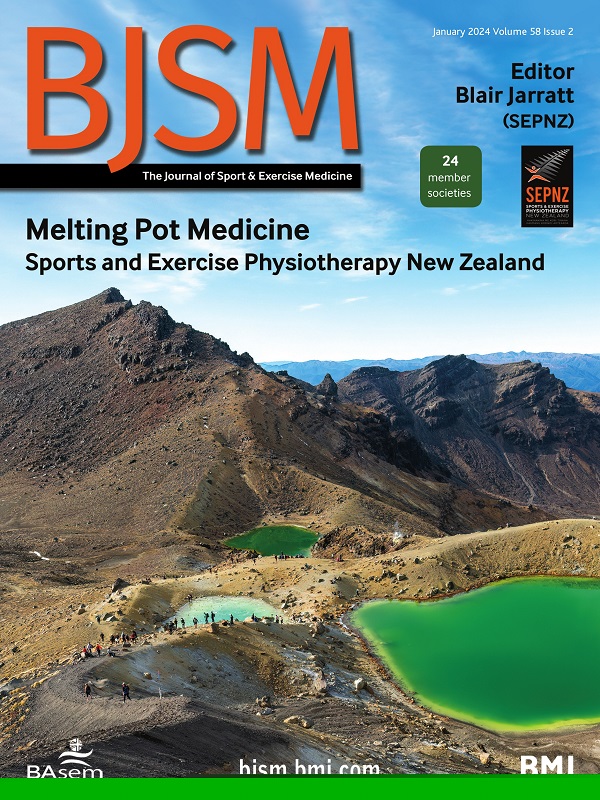Impact of sleep on postpartum health outcomes: a systematic review and meta-analysis
IF 11.6
1区 医学
Q1 SPORT SCIENCES
引用次数: 0
Abstract
Objective To examine the impact of postpartum sleep interventions and postpartum sleep on maternal health outcomes. Design Systematic review with random-effects meta-analysis. Online databases were searched on 12 January 2024. Study eligibility criteria Studies of all designs (except case studies and reviews) in all languages were eligible if they contained information on the population (individuals up to 1-year post partum), sleep interventions/exposures including (type, duration, frequency, alone or in combination with other components), comparator (control or different duration, frequency or type of sleep intervention) and outcomes: mental health, cardio-metabolic, postpartum weight retention (PPWR), low back pain and pelvic girdle pain, breastfeeding and urinary incontinence. Results 60 studies (n=20 684) from 14 countries were included. ‘High’ certainty of evidence showed that sleep interventions were associated with a greater decrease in depressive symptom severity compared with no intervention (five randomised controlled trials; n=992; standardised mean difference −0.27, 95% CI −0.40 to –0.14; small effect). Sleep interventions had no impact on the odds of developing depression (‘moderate’ certainty of evidence) or anxiety or anxiety symptom severity (‘low’ certainty of evidence). Additionally, ‘low’ certainty of evidence demonstrated no effect on cardiometabolic outcomes (systolic blood pressure, diastolic blood pressure, mean arterial pressure), anthropometric measures (maternal weight, body mass index) or prevalence of exclusive breastfeeding. ‘Low’ certainty of evidence from observational studies found that high-quality sleep reduces the odds of developing anxiety and reduces the severity of depression and anxiety symptoms. ‘Low’ and ‘very low’ certainty of evidence from observational studies found that shorter sleep duration is associated with greater PPWR. Conclusions Postpartum sleep interventions reduced the severity of depression symptoms. No data are available. n/a.睡眠对产后健康结果的影响:一项系统综述和荟萃分析
目的探讨产后睡眠干预及产后睡眠对产妇健康结局的影响。设计随机效应荟萃分析的系统评价。在线数据库检索于2024年1月12日。所有语言的所有设计(案例研究和综述除外)的研究均符合条件,如果它们包含有关人群(产后1年以内的个体)、睡眠干预/暴露(类型、持续时间、频率,单独或与其他成分结合)、比较(对照或不同持续时间、频率或类型的睡眠干预)和结果的信息:心理健康、心脏代谢、产后体重潴留(PPWR)、腰痛和骨盆带痛、母乳喂养和尿失禁。结果纳入来自14个国家的60项研究(n= 20684)。“高”确定性的证据表明,与不进行干预相比,睡眠干预与抑郁症状严重程度的显著降低相关(五项随机对照试验;n = 992;标准化平均差- 0.27,95% CI - 0.40 ~ -0.14;小的效果)。睡眠干预对患抑郁症(证据确定性为“中等”)或焦虑或焦虑症状严重程度(证据确定性为“低”)的几率没有影响。此外,“低”确定性的证据表明,母乳喂养对心脏代谢结果(收缩压、舒张压、平均动脉压)、人体测量指标(母体体重、体重指数)或纯母乳喂养的流行率没有影响。来自观察性研究的“低”确定性证据发现,高质量的睡眠可以降低患焦虑的几率,降低抑郁和焦虑症状的严重程度。来自观察性研究的“低”和“非常低”证据的确定性发现,较短的睡眠时间与较高的PPWR相关。结论产后睡眠干预可减轻抑郁症状的严重程度。无数据。N/A。
本文章由计算机程序翻译,如有差异,请以英文原文为准。
求助全文
约1分钟内获得全文
求助全文
来源期刊
CiteScore
27.10
自引率
4.90%
发文量
217
审稿时长
3-8 weeks
期刊介绍:
The British Journal of Sports Medicine (BJSM) is a dynamic platform that presents groundbreaking research, thought-provoking reviews, and meaningful discussions on sport and exercise medicine. Our focus encompasses various clinically-relevant aspects such as physiotherapy, physical therapy, and rehabilitation. With an aim to foster innovation, education, and knowledge translation, we strive to bridge the gap between research and practical implementation in the field. Our multi-media approach, including web, print, video, and audio resources, along with our active presence on social media, connects a global community of healthcare professionals dedicated to treating active individuals.

 求助内容:
求助内容: 应助结果提醒方式:
应助结果提醒方式:


